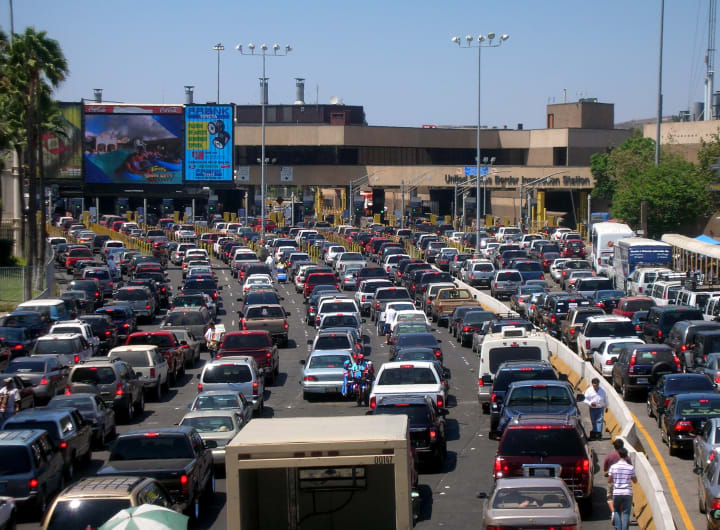The US Mexico Border is a Train Wreck
A (Very) Slow Moving Disaster

Author's preface: Early in the writing process for this article I realized that my friend and writing colleague, Samantha Drobac, who holds dual Mexican and US citizenship, could bring a perspective that one written only from the US point of view would lack. Initially, I thought I would publish the completed piece and then ask her to reply in a separate post, but as the story evolved it seemed more useful to ask her to respond directly to many of my points.. Fortunately, she kindly agreed to participate and her responses and her own interjections are included throughout the body of the story. Our commentary/discussion is indicated by our initials DD and SD and in italics while the main body of the text is not italicized and was solely authored by me.
DD: And already I need to ask you some questions Samantha. What do you think about the title? Too much? Accurate? What alternate title might you suggest?
SD: Hi, Dan. The title befits the situation at the border between the US and Mexico quite well. However, I’m pretty sure most people don’t realize that California’s main border crossing --at San Ysidro-- is one of the most heavily transited in the world. Hence the train wreck. When it comes to the subtitle though, I would have suggested something along the lines of: “A backlash of Manifest Destiny”—but yours works too.
I recently published here describing the background and reasons for moving to Mexico following my wife landing a new job in San Diego. Almost three weeks ago now I returned from a first visit to my new home and my first experiences with the border crossing between the US and Mexico. I crossed into Mexico and back only four times during this recent trip but each crossing was a unique, interesting, frustrating, and one time scary experience. My overall impressions are decidedly negative as most likely inferred from the title of this piece.
Like a war, but only one side is fighting
The contrast in styles between Mexican immigration personnel (a mix of military and civilian functionaries and law enforcement) and US customs and border patrol (CBP) could not be starker. Though their outward appearance and demeanor are similar; heavily armed and body armored men (exclusively men on both sides of the border from what I saw) milling about looking grim and dour, and very, very serious, their attitudes and approach to personal interactions with border crossers could not be more different. Mexican immigration officials were by and large respectful, welcoming, and helpful, or at least as helpful as such officials can be. They went about their business with calm professionalism and a generally peaceful attitude. US CBP, on the other hand, exuded a hyper aggressive and militant aura. They were disrespectful, unhelpful, and suspicious of everyone and everything. They used classical microaggression techniques to annoy, irritate, and just plain frustrate at every opportunity. A great example of this comes from my wife who relayed a story of crossing the border on foot carrying a cup of coffee. US CBP actually stopped her and required her to pay duty on that one dollar cup of Joe. This resulted in a 30 minute delay for my wife as loads of paperwork needed to be filled out and filed in order that the US could collect their 20 cent import duty. Lest you think they were just "following regulations" she has crossed that same border on foot many times with coffee and only once was she stopped and asked to pay this tax. For both sides when it comes to "regulations" at the border, they seem to be fluid, flexible, and at the partial or complete discretion of whomever happens to be working that day. Many of these negative traits are amplified when dealing with women, especially women alone, crossing the border, as my wife can attest. These are my impressions of US CBP as a US citizen, I can only imagine how they must seem to your average Mexican crossing the border into the United States.
Of course, I recognize that US CBP are doing a very dangerous job for low pay and little (positive) recognition. For the most part they come in for verbal beatings like the one I just applied, but when they stop or arrest a dangerous felon, or prevent a violent shooting, nobody hears a peep about it. Part of this is the nature of law enforcement, where, particularly at the border, secrecy and security often go hand in hand. However, part of it is I think, an active disdain on the part of some US media and public officials for the entire Mexico/US border question and anyone or anything associated with it. US CBP just happens to be a convenient target for their political grievances, which they cannot or will not settle no matter what the current situation may be. Those politically motivated attacks are unjust and unfair and I will actively defend US CBP or any law enforcement officials engaged in unpopular actions against them. All that said, US CBP does themselves no favors when they play into the worst prejudices and fears of their detractors with their behavior and attitudes, and boy, did they ever do that when I was there. I am not asking for smiles and laughs, or even kindness. Not looking for a reduction in people, or weapons, or body armor, or security practices of any kind. All I am suggesting is that a small change in style/demeanor, away from combative and suspicious, and toward a more neutral and calm professionalism, would go a long way toward improving US CBP’s reputation. This would require they drop their current hyper aggressive stance and prejudgments. And, please stop with the morality lectures of the sort my wife is constantly bombarded with each time she crosses into the US from Mexico (see below for more on this).
DD: Samantha what say you? I know you can't speak for all Mexicans but in general how do they feel about US CBP and the process of crossing the border into the US?
SD: One of the advantages of being bicultural is having the ability to spot the differences between both countries, and, like everything in life, they each have their pros and cons.
How can one talk about issues of the present without looking into the past? There’s a lot in our shared Mexican/US history that sheds light on the current state of affairs at the border (and others). It explains the demeanor you mention from CBP, as well as the way women are treated when traveling alone. Many will stand up for CBP, as you did in the paragraph above, and argue that such authorities are doing their best to keep the US safe from drug cartels, child trafficking, and/or illegal immigrants. This is valid and justified.
Shootings at the border crossings (I believe the last one was just a couple of months ago) do not help either side. This explains why you and your wife are seeing authorities as you’ve described—suspicious of anything and everything.
However, you also mentioned “unhelpful and disrespectful”. That’s where history comes into play, I am a firm believer that many of us (or all) are carrying “transgenerational trauma”, causing certain negative reactions such as discrimination or resentment. We all know historical events play a big role in human interactions, and there is much shared history between the US and Mexico. Because of this, the border between the two countries is, I believe, a prime location where certain negative tendencies will be amplified. Take for instance the Mexican American war (1846-1848). Like any big conflict, it’s complicated. However, its cause can be summed up in one word, expansionism--US expansionism. More specifically, the addition of California and New Mexico to the US because they [Americans] believed that was God’s intended plan for them. Even though the term Manifest Destiny was coined by a newspaper editor, Americans didn’t seem to disagree with the sentiment behind it, and many held to the arrogant belief that Americans were somehow appointed or ordained by God to expand their territory from the Atlantic to the Pacific. Some historians have said that Manifest Destiny created the belief in Americans that they were of a higher race.
Americans initially offered $30million to purchase California and New Mexico from Mexico, but the Mexican president declined the offer. So, US president [Polk] sent someone [Winfield Scott] down to Mexico to “negotiate” another deal where they [Mexican government] ended up not only selling California and New Mexico, but they sold it for half the initial asking price and they threw in Utah, Nevada, Colorado, and Arizona into the final deal.
This piece of history is relevant because it hints at the ways situations were handled and the sort of mindset behind their actions. It implies that the strong took advantage of the weak. This does not include the previous “tiffs” that lead to such battle. I guess all’s fair in love and war.
Actually, I wouldn’t be surprised if the level of one’s nationalism is a requirement for the job as a CBP official.
DD: Samantha, you and I went round and round in comments on this particular section as we edited various drafts of this article and I feel like we did not make a lot of progress in understanding each other. Probably a lot like what happens every day at the border. I still don’t know that I can believe the transgenerational trauma hypothesis when ignorance of the Mexican-American war among the US population is so high. See an article I wrote here for more on this. But beyond that not sure how the example you gave “implied the strong took advantage of the weak.” In my opinion it did much more than imply that, it showed it very clearly. I am also struggling to understand what you mean by “this does not include the previous “tiffs” that lead to such a battle.” What is the “this” you are referring to, and what are the “tiffs” and how did they “lead to such a battle”? What battle are you talking about here? The Mexican American War as a whole or some specific battle that took place within it? Finally, I am really clueless on how “all’s fair in love and war” fits into the picture though I do think it is highly probable there is some “unwritten” requirement that US CBP be highly nationalistic. Mostly, I think the entire argument is a stretch as 95%+ of Americans, including probably the same percentage of CBP have no clue what the Mexican American war was, or was about, or even that there was a war. I believe transgenerational trauma is a real thing but it has an ending. It ends when subsequent generations “forget” there ever was any trauma. Ignorance of history, in cases like this, is actually a positive thing for once.
SD: On top of this, we have the Covid-state-of-mind. Covid has changed people’s lives, and some more than others. But it seems that Americans are on edge because of Covid. Mexicans? Not as much… as long as there’s Corona or Pacifico at the stores, you’ll have some happy (Mexican) campers.
Along the same lines, from my perspective it appears that American’s are very sensitive in general. Mexicans are used to the dirt—if you will. Not all of course, but we are talking about the “average Mexican”, like the ones you’ll often see crossing the border. They are used to the sort of treatments you experienced from CBP. In my opinion the difference is that Mexicans have a greater mental resilience, and therefore, it’s much easier for them to brush things off than for your “average American.” In the end, Mexicans know what’s waiting for them at the border. And, although they do hope for the best, they are always mentally prepared for the worst.
[This is all applicable to your “average Mexican.” Mexicans with actual power and money are a completely different story.]
One last thing. Mexicans don’t want to leave their beautiful and culturally rich home to go to the United States. They go because they must. Because the minimum wage in Mexico ranges between $140-$220 pesos per day ($4-$11 USD). Could this be why they resort to illegal acts? Obviously a factor. Is it justified? No. Can we judge them? No. Would you do the same if you were in their exact same shoes? Quite possibly. Yet, despite all this, they remain smiling and kind. The few that are “fortunate” and find a way to stay in the US, leave a big portion of their lives behind, including family. As a way to relieve their homesickness, Mexicans would meet and shake hands with their families back in Mexico through iron poles that divided California and Tijuana. Until a more restrictive gate was erected in addition to the iron poles—now such divided families can no longer shake hands.
The border is not a place where morality exists. Instead, it is a place that clearly shows the effects of past decisions. In other words, everything we do will have an immediate or delayed effect and everything we are witnessing globally (not just at the border) is the reflection of the amount of good and bad decisions made in the past.
DD: Guess I have to get in the last word but I am not prepared as yet to go as far as you do and suggest that the border is “not a place where morality” exists. Surely, there are at least some good, moral people, that work on both the US and Mexican sides. And, if there are moral people, than there is morality.
For all intents and purposes it felt like I imagine a wartime border crossing must feel like. But, in this case, only one side, the US, is actually fighting. The Mexicans seem to treat the US border much like they probably treat any other border with any other country. The big difference being the Mexicans actually want Americans to visit and reside in their country as we are a major source of income for the government and the average Mexican citizen alike. In contrast, for many Americans we are at war with Mexico, or at least we should be. What exactly the war is about is not always clear, but seemingly it has something to do with Mexicans sneaking into the US and stealing our jobs, while flooding the country with illegal narcotics at the same time. Meanwhile, the US border wall sits there, ugly, and oppressive, sending a gigantic FU signal to any and all Mexicans who see it. Could there be a worse signal to a supposed friend and ally than a massive wall built at the border. We love you Mexico, but not that much, please stay at least 100 feet away at all times. That monstrosity is possibly the biggest strategic mistake yet made by America. I rank it even above invading Afghanistan in my top five of the poorest choices America has ever made.
Three border crossings in Baja California region

It is also important to recognize that there are three border crossings into Mexico in the Baja, California region (Tecata, Otay Mesa, and San Ysidro), and each has its own style and defining characteristics. One thing each of the three crossings do share is the contrasting attitudes and behaviors of US personnel and Mexican immigration officials as I described above. Another thing they share is a propensity for very long wait times with the Tecata crossing (usually) being the lone exception. Unfortunately it is very far east and in a very rural region thus even though one may get across the border quickly, all that time is lost in the driving needed to get back to civilization on either side of the border.
Chaos and confusion
One other thing all of the border crossing share is an almost total and complete lack of signage indicating where one is supposed to go and/or what one is supposed to do. This leads to a variety of problems especially since there are no less than three distinct lanes within which one may cross the border depending on a variety of factors relating mostly to what official documents and/or pre clearances one does or does not possess. It also almost lead to my own arrest when a lack of signage, or at least signage I could see, caused me to miss a left turn I was supposed to take to exit, instead going straight, and ending up inadvertently in the secondary inspection area without an invitation to be there. This, as it turns out, is a very bad thing to do. Combine the lack of signage with massively unhelpful and actively obstinate US CBP officials and the result is mass chaos, massive delays, and a total breakdown of process and order.
Illegal immigrants in Mexico
An ironic fact that not many appreciate is that the majority of Americans living in Mexico are there illegally. Their visitor visas expired long ago and they either never got or have expired temporary residence visas. Almost none have permanent residence visas. The procedures for obtaining Mexican temporary or permanent residence visas are arcane and seemingly fluid. We have only just begun the process of trying to get either one for myself and/or my wife and have hit roadblock after roadblock. My feeling is that the Mexicans are exacting a little diplomatic revenge on the US by making things extra difficult for US citizens seeking residence visas. That said, I also believe with enough persistence we will be able to get a residence visa of either the temporary or permanent variety for one or both of us. This is very much needed as it guarantees we will be able to get back into to Mexico should they "close the border" again. See my earlier piece linked above to learn why close the border is in quotes.
DD: Does this fact not bother Mexicans? The hypocrisy of the American position on “illegals” is breathtaking when viewed in light of this little known fact.
SD: It doesn’t really bother Mexicans at all, actually. Americans are great consumers for our country. Whether you are living in Mexico with or without the proper paperwork, we really don’t care. You buy our homes here because it’s cheaper. You also hire our gardeners, cleaning ladies, chefs, chauffer, etc. It’s very convenient for us [Mexicans] to have you here. Now, as far as the process for getting a residence visa goes, that’s just Mexico so don’t take it personal. Many important processes like that are still very archaic and it takes them a very long time to process but also they have no rush to do so because of the things I mentioned previously—it doesn’t stop Americans from consuming.
DD: A quick clarification. If you are not a citizen of Mexico you cannot actually buy property there. There are some persons/groups that suggest as a permanent resident you may be able to purchase land/real estate by working through a bank or trust or other financial entity based in Mexico, however it has been impossible to confirm or deny the accuracy of that. Like many things in Mexico, it seems to depend on whom you ask. Note: Follow up discussions and research on this topic have led to even more confusion on my part as to the accuracy of the above statement. The best I can tell at the moment you can 'buy' property in Mexico as a non citizen but in the end, even if you think you 'own' it, you do not, Mexico does. Theoretically they could legally seize it at any time. Of course, they would never do that. Right?
The Treatment of Women Crossing the Border is Outrageous
If you are a woman, more specifically, a woman traveling alone across the border, prepare yourself for quite a treat. You are virtually guaranteed to be in for any one of a number of differently themed morality lectures, each more unhelpful and backwards than the last. Primarily you will be lectured incessantly about how dangerous Mexico is, how you should not be traveling alone there, and if you happen to live there, how dumb of an idea that is. I have news for Mr. Border crossing guard, my wife is more than capable of taking care of herself. She is 6' tall, athletic, and very powerful. She holds a green belt in Krav Maga, the fighting style of the Israeli military and secret police which combines elements of all martial arts, but has capabilities far above her belt level. She is proficient or near expert-level with just about every stabbing and shooting weapon known to man. Moreover, she almost always travels in the company of our 140 lb Anatolian Shepherd (Kangal) Enki. He is a gentle giant but he is a livestock Guardian dog in his natural state. Make no mistake if he feels his property is being threatened he will defend it, and defend it with extreme prejudice. These dogs have been known to take down big cats in the wild, and they have the strongest bite force of any dog on Earth. When provoked they are downright frightening to behold. The site of Enki alone is usually enough to deter any would-be attacker, but for any unlucky or unfortunate enough to attack in any case I predict they would last about 15 seconds before ending up in the hospital or possibly the morgue. Even against three or four armed attackers I would lay even odds on Enki and Jen. So no, Mr. Border guard, generally speaking, she does not need to be worried for her safety.
DD: Can you add anything here Samantha? How do Mexican women feel about this issue?
SD: Mexican women are no stranger to the word: “submissive”. Unfortunately, to this day it is still very common to find this at the core of their everyday life. In other words, they know where they stand on the social hierarchy, especially when confronted with US authorities.
DD: Woah. That last sentence was like a kick to the gut. “They know where they stand on the social hierarchy” is disturbing both in the matter of fact way in which you put it, and the fact that the matter stands in such a way that it can be put that way. How common is that view of women in Mexico? Do women hold that view of themselves as well or is this coming only from men? Realize a bit off topic vis a vis the border but I would like to hear more about this from you.
SD: Sadly, this view is very clear for many women in Mexico. However, as Feminism becomes a more popular word in conversations, this view is slowly losing strength. Mexico is still highly patriarchal, not as extreme as we see in the Middle East but enough that women recognize its existence. Women in Mexico definitely feel like “things” sometimes.
About the Creator
Everyday Junglist
Practicing mage of the natural sciences (Ph.D. micro/mol bio), Thought middle manager, Everyday Junglist, Boulderer, Cat lover, No tie shoelace user, Humorist, Argan oil aficionado. Occasional LinkedIn & Facebook user






Comments
There are no comments for this story
Be the first to respond and start the conversation.